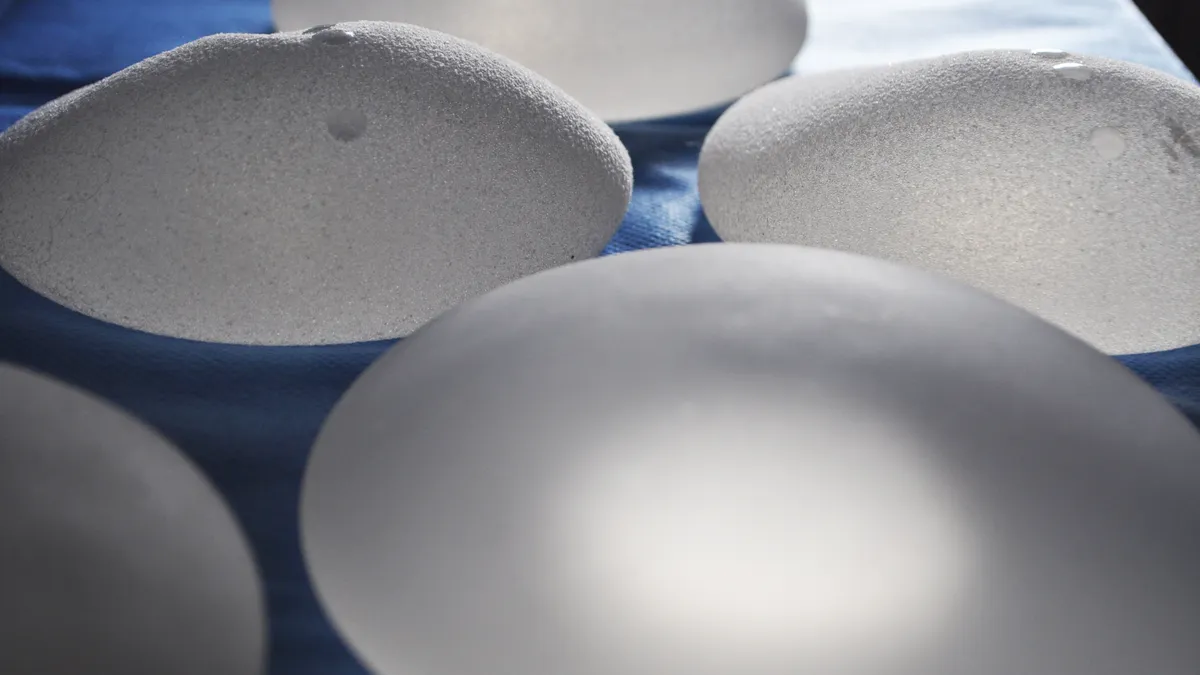Dive Brief:
-
Demand for Sientra’s breast implant products recovered swiftly in its second quarter, causing sales to come in down 17% despite the delaying of procedures due to COVID-19.
-
The results, which Sientra released Monday, compare favorably to those of breast implant rivals such as Establishment Labs and AbbVie’s Allergan, which reported deeper declines in their second quarter financials.
- Sientra CEO Jeffrey Nugent said his company is “clearly taking share” and, with the upward trend continuing into the third quarter, is hiring to cope with increased demand.
Dive Insight:
The breast implant sector and broader medical aesthetics industry took a hit early in the pandemic as countries focused healthcare resources on COVID-19 and potential customers stayed home. Yet, the severely negative impact of the coronavirus outbreak appears to have been short lived, at least for Sientra.
Second quarter breast product sales fell 17% in the quarter. Excluding scar treatment Biocorneum, breast product sales fell 13%. To put those figures in context, Establishment Labs reported a 52% drop in sales. AbbVie, which acquired breast implants in its $63 billion acquisition of Allergan, does not break out sales of the devices. Sales at AbbVie’s “other aesthetics” unit fell 42%. Sientra seized on the results to argue it is outcompeting its rivals.
“We believe that this performance is a standout in the aesthetic space with other sets of companies reporting high double-digit declines this quarter. We believe we are clearly taking share with the continued addition of new accounts as well as gaining deeper penetration within existing accounts,” Nugent told investors on a second quarter results conference call.
Nugent said Sientra’s breast product revenues were flat in May and June and the “improving trend” continued into the third quarter. At this stage, Nugent is unsure if the improvement “reflects a bolus of pent up demand” or a more lasting change but is confident enough to invest in response to the trend. Sientra is adding customer service, distribution and manufacturing positions.
The confidence is, in part, a reflection of Sientra’s interactions with women and surgeons. A Sientra survey found more than 90% of women who were considering breast augmentation before COVID-19 still plan to have the procedure. Sientra also has anecdotal evidence that “numerous” surgeons “are booked months in advance.” Members of the American Society of Plastic Surgeons said breast augmentation has been the second most requested treatment this year after Botox.
Establishment Labs faces somewhat different dynamics due to the geographic focus of its business. Brazil is the company's biggest market. COVID-19 has hit Brazil hard in recent months, leading the country to prohibit elective procedures during the second quarter. Establishment Labs CEO Juan José Chacón-Quirós told investors last week that “procedures are currently running at about half the normal rate.” Surgeons are also reserving space for when restrictions are fully lifted.
The improving situation in Brazil and other countries led Establishment Labs to predict third quarter sales of up to $21 million, around twice as much as it brought in across the second quarter. Analysts at Jefferies said “the breast implant market continues to be ripe for [Establishment Labs’] taking” despite the pandemic slowing its progress.
The belief that Establishment Labs can corner the breast implant market reflects the struggles of one of its main rivals, Allergan. Last year, Allergan recalled its Natrelle Biocell textured breast implant following reports of recipients developing a rare lymphoma.
However, there is evidence the public is unaware of the safety problems. A survey of 500 American women found 14% of people had heard of the rare lymphoma and Allergan began a “dedicated multi-channel campaign” in June to reach patients unaware of its recall. Even so, the recall and related safety issues are a blow to Allergan and boon to its rivals.










